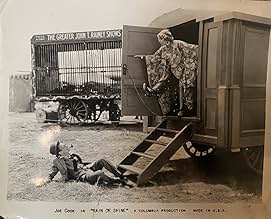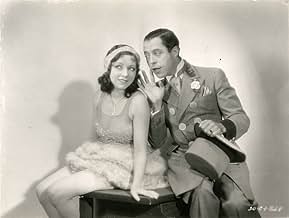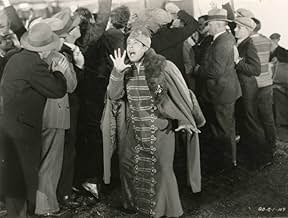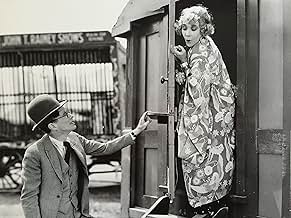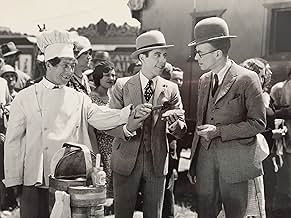Woman inherits a traveling circus which brings financial difficulties.Woman inherits a traveling circus which brings financial difficulties.Woman inherits a traveling circus which brings financial difficulties.
- Dave
- (as Dave Chason)
- Mr. Conway
- (as Edward Martindale)
- Lord Hugo Gwynne
- (as Tyrrell Davis)
- Charlie the Gorilla
- (uncredited)
- Boy at Circus
- (uncredited)
- Carmencita, The Fat Lady
- (uncredited)
- Extra
- (uncredited)
- Waiter at Dinner Party
- (uncredited)
- Director
- Writers
- All cast & crew
- Production, box office & more at IMDbPro
Featured reviews
By the time this film went into production, the vogue for musicals was over, so all the songs were cut from the film (a common occurrence in 1930). Still, there was enough plot to carry the 90-minute film.
Joe Cook was the star. The long-forgotten, Cook was a major star on Broadway. His nickname was "the one-man vaudeville" because he could sing, dance, do comedy, and perform a series of juggling tricks. Cook made his film debut in a 1929 talkie short called AT THE BALLGAME.
In RAIN OR SHINE he plays the fast-talking manager of a failing circus owned by a girl (Joan Peers) who inherited it from her father. Two employees are in cahoots to ensure the circus fails so they can take it over. In a weak subplot, Peers and her boyfriend (William Collier, Jr.) attend a disastrous dinner party at his snooty parents' mansion.
Cook is front and center through most of the film as he attends to all the problems and egos under the big top. There's also a funny running gag with Cook and a local citizen (Tom Howard) and how he becomes a partner with the help of the Princess (Louise Fazenda).
The finale is quite exciting after the bank attaches the day's receipts and the performers realize they won't get paid. Cook is terrific in a series of circus tricks as he tries to put on a big-top show all by himself. Peers and Collier are OK as the young lovers, Fazenda has little to do, Howard is funny as the local, and Dave Chasen (who founded the famous restaurant) is funny as the stooge.
This is like an exploitation film of the circus. It easily could have been the documentary about life of circus people; that would have been actually pretty impressive, since there are not much documentaries about circus folks, at least not at that time. Errol Morris' Fast, Cheap & Out of Control is almost 70 years later.
But I digress. There is not much plot here, it's just circus doing circus in front of the camera. Acting is poor, story is not existent and it's pretty obvious that Capra at that time was the gun for hire and did what studio demanded.
There is only one reason to watch this film. If you are on a Capra marathon, e.g. you want to see all the Capra film, go ahead. If you don't seek to accomplish that, just stay away from pre-1933 Capra films. Almost all of them are pretty bad.
Frankie (Louise Fazenda) has inherited her father's circus upon his death, and the first season with her in charge is coming to a ruinous close. Her circus manager Smiley (Cook), a jokey fellow who always has a line to try and cheer her up, is optimistic about the future, an optimism shared by Bud (William Collier, Jr.), Frankie's beau (though there seems to be a conflict between the two men for Frankie's heart, though it comes to nothing) because they are coming upon his hometown of Shrewsberry where they'll get great crowds and turn things around. At the same time, the star horse rider, Dalton (Alan Roscoe), and band leader, Foltz (Adolph Milar), conspire to pool their resources and ideas to buy the circus out from Frankie when she hits a bad moment.
You see, this story is surprisingly serious, and I bring up the Marx Brothers because they were being introduced to the world in the early sound era through adaptations of their stage plays that were relentless applications of vaudeville comedy. We get that in sections mainly through the interactions of Smiley with the local Amos K. Shrewsberry (Tom Howard) with whom he develops a twisted little relationship based on Smiley's fast talking style to con him out of thousands of dollars while Shrewsberry just sticks around in befuddled style. However, that gets intercut with this stuff around Frankie dealing with the finances, her relationship with Bud, and her attempt to enter high society of Shrewsberry that Smiley completely ruins.
What helps the film is that it allows Cook to do his thing for long stretches. He really does remind me of some combination of Groucho and Harpo Marx (mainly because he does the hat in the foot thing once). He's a fast talker that has his own bits that he plays all the way through, mostly to Howard who works so well with Cook that I assumed they were a team. How Smiley talks Shrewsberry into handing over $5,000 is just a wonderful display of rhetorical excess. How Shrewsberry tries to mimic it later is the work of a talented performer as well. This movie rises and falls on its comedy, and I just wish there was more of it.
Because when the plot reappears with Frankie getting all angry at Smiley for ruining the big dinner, it just feels so out of place. I was thinking of how Margaret Dumont always reacted to Groucho, just kind of accepting his manic behavior as largely normal and continuing on with the action of the plot, and how much that worked as opposed to these starts and stops of earnestness in the face of ridiculousness.
However, I will give the film credit for the scale of its ending. Dalton and Foltz execute their plan to get Frankie desperate and sell the circus to them (considering the crowds, it doesn't make the most sense, but okay), and all chaos erupts, reminding me of the ending to Capra's first film, the Harry Langdon starring The Strong Man. There's something to be said about the sheer amount of chaos unleashed. It's kind of fun to watch.
There's also a very late moment when, in the detritus of the chaos, Smiley and Shrewsberry calmly sit together and go through one of their routines in a quiet manner, which seems to be the one point in the film where the two diametrically opposing tonal forces of the film actually meet. It doesn't lead to anything, but it's a surprisingly nice moment.
So, the dramatic elements are not that good, never really go anywhere, and kind of half-formed at best. However, the comedy is generally pretty good and fun to watch. I just wish that Capra had changed the source material (a musical play by James Gleason and Maurice Marks) more than by cutting out the musical numbers to make it an outright comedy. But, what do I know? It was apparently a box office success.
** (out of 4)
Mary Rainey (Joan Peers) takes over her father's circus after his death but soon finds herself in major financial trouble. The manager, Smiley Johnson (Joe Cook), always has a positive spin on everything but soon not even his fast talking can help the situation. Opinions on this film seem to be extremely mixed and I'm going to have to fall on the negative side. It's rather hard and perhaps unfair for my to criticize the film for the reasons I'm going to but here goes. I found Cook to be an incredible talent here and he gives an amazing performance. At the same time I'd say his performance was too amazing because he plays an annoying character and that's exactly how it struck me. The frustration the owner in the film has over his attitude and actions is the same frustration I started to feel and this really started to take away from the film for me. The first thirty-minutes kept me entertained but then I finally hit a wall to where I was wanting to hit certain characters. Again, it's somewhat unfair for me to bash Cook for giving a great performance but I couldn't help but to have his character on my nerves. The supporting performances are rather good as well and that includes Tom Howard as a dimwitted fool who can't keep anything straight. In perhaps the funniest and most unbelievable sequence, Ethel Greer, a real life "Fat Woman", falls out of a trailer and gets stuck in the mud. The men can't pick her up due to her large weight so they have to get an elephant to do the job. This scene is certainly outrageous and in some ways so shocking that I couldn't help but laugh my behind off. The ending picks up a lot of steam but by that point I was pretty much wore out and ready to move on.
In this movie, Cook plays the utility man in the Rainey Circus, which gives performances "Rain or Shine" ... except that it's always raining. When most of the circus performers can't go on, Cook becomes virtually a one-man circus, with just a couple of helpers for his acrobatic routines. Joe Cook's chief stooge in this film (and on Broadway) was Dave Chasen, a Harpo-ish comedian who later became famous as the founder of Chasen's Restaurant in Los Angeles. Chasen's schtick was a distinctive hand-waving gesture which many comedians today are still copying.
Joe Cook is brilliant in this film. In one scene, he does an astonishing juggling trick with a cigar and a kitchen match that will make you want to rewind several times so you can watch it again ... and again, and again! It looks so simple, yet Cook must have spent hundreds of hours practising this one trick.
"Rain or Shine" has a lot of broad slapstick humour, most of it hilarious. One scene at a dinner party doesn't work, involving a huge pile of spaghetti. We can clearly see that the "spaghetti" is really twine, which kills the joke. Unfunny comedian Tom Howard plays a grouch named A.K. Shrewsbury, and there's an obscure joke about what an "A.K." he is. (A.K. = "alter kocker", a Yiddish insult.)
Among the circus acts in this movie is Ethel Greer, a fat lady who weighed well over 25 stone. I was astonished by the scene in which this huge woman falls out of her circus caravan into a rain puddle. Ethel Greer actually did this stunt herself, because no stuntwoman was large enough to double for her. Kenneth Anger's book "Hollywood Babylon 2" contains a photograph of an immensely fat woman whom Anger unkindly claims is Elizabeth Taylor. She's not, you know: she's Ethel Greer, and the photo in Anger's book is a scene from "Rain or Shine". Also in this movie is a snake charmer, played by silent-film comedienne Louise Fazenda in a rare sound-film appearance. (Fazenda married producer Hal Wallis and retired.)
Some bad news: the dignified African-American actor Clarence Muse appears in this film, playing one of the "Yassah, boss" roles that Frank Capra kept lumbering him with. In Capra's autobiography, he refers to Muse as his "pet actor". No comment. SPOILER WARNING: At this film's climax, the circus tent catches fire. There's an exciting sequence as Cook and all the circus hands try to put out the flames. Ironically, the only time it STOPS raining on the circus in "Rain or Shine" is when the tent is on fire and the rain would have done some good. As soon as the fire is out, the rain starts pouring down again. "Rain or Shine" is must-see viewing! My rating: 10 out of 10, since Joe Cook's brilliant talents more than compensate for any of this film's flaws.
Did you know
- TriviaThe main character, Smiley Johnson, explains to Tom Howard that he was born in Evansville, Indiana. In fact, Joe Cook, the actor who played Smiley, was born in Evansville, Indiana.
- Quotes
Amos K. Shrewsberry: Just a minute. I want to see you. I've got a feed bill here I want to talk to you about.
Smiley Johnson: Say, brother, you certainly were a big help to me. Now, I know what you're gonna say, you're modest and you want to make me believe you don't have it all. I want all these good folks to know what a great guy you are. You're not the mayor here, are you? You know the minute I laid eyes on you, I says to myself, now there's a man who looks just like Jimmy Walker and he should ought to be mayor of this cute little town.
Amos K. Shrewsberry: No, I'm not the mayor, but I'd like to see you inside alone.
Smiley Johnson: Alone? That will be impossible, I'll be with you.
- Alternate versionsWhen this film was produced, not all theaters had converted to the "sound on film" system. Also, some of the dialogue was too lengthy to include on inter-titles or referenced things unfamiliar to foreign audiences. To address these issues, Columbia and other studios filmed foreign and domestic versions simultaneously with the same cast. (They would soon switch to filming separate versions, utilizing the same sets but different casts as was the case with the Spanish version of Universal's "Dracula.") The 68 minute "silent" international version is included on the Turner "Frank Capra: the Early Collection" set. (Some spoken dialogue remains without any title cards, mainly in the climatic fire sequence.) Most of the banter is eliminated but additional tricks and stunts have been added. Although both versions were directed by Capra (usually there were separate crews), the international version has additional scenes fleshing out the Ringmaster's machinations. It also features an alternate ending to the domestic version.
- ConnectionsFeatured in Charlie Gemora: Uncredited (2016)
- SoundtracksHappy Days Are Here Again
(1929) (uncredited)
Music by Milton Ager
Played during the opening and credits and at the end
Also played at a circus performance
Details
- Release date
- Country of origin
- Language
- Also known as
- Pasa el circo
- Filming locations
- Burbank, California, USA(ranch: James J. Jefferies')
- Production company
- See more company credits at IMDbPro
- Runtime1 hour 28 minutes
- Color
Contribute to this page


